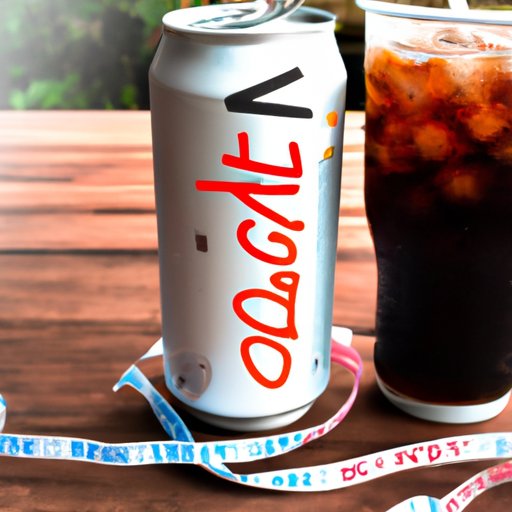Introduction
Diet sodas are a popular alternative to regular soda, offering a lower calorie option without sacrificing sweetness. But are diet sodas actually healthy? In this article we will explore the potential health risks associated with drinking diet sodas, as well as the potential benefits for weight loss goals.
Analyzing the Health Risks of Diet Sodas
Diet sodas contain artificial sweeteners instead of sugar, which have been shown to have some potential health risks. Additionally, diet sodas may have an impact on weight loss goals, and their nutritional profile is not always ideal. Finally, many diet sodas contain caffeine, which can also have health implications.

Examining the Impact of Artificial Sweeteners on the Body
Artificial sweeteners, such as aspartame, saccharin, and sucralose, have been used in diet sodas since the 1970s. While they are considered safe by the FDA, there is some evidence that these sweeteners can have negative effects on the body. Potential side effects include headaches, dizziness, nausea, and diarrhea. There is also some concern that long-term use of artificial sweeteners can lead to metabolic syndrome, obesity, and other chronic diseases.

Exploring How Diet Sodas Affect Weight Loss Goals
Some people believe that drinking diet soda can help them lose weight, but this is not necessarily true. While diet sodas do not contain calories from sugar, they can still have an impact on appetite. Studies have found that artificial sweeteners can stimulate appetite, leading to increased food consumption and ultimately weight gain.
Additionally, diet sodas can increase calorie intake in other ways. People who drink diet sodas often consume more calories from other sources, such as sweets and snacks, than those who do not drink diet sodas.
Investigating the Nutritional Profile of Diet Sodas
Diet sodas are often marketed as a healthier alternative to regular sodas, but they do not provide any essential nutrients. They contain no fat, protein, or fiber, and very few vitamins and minerals. The only notable nutrient in diet sodas is sodium, which can be problematic for people with high blood pressure.

A Look at the Caffeine Content in Diet Sodas
Many diet sodas contain caffeine, which can have both positive and negative effects on health. The recommended daily allowance of caffeine is 400 milligrams, which is equal to about four cups of coffee. Most diet sodas contain between 30 and 60 milligrams of caffeine, so it is important to keep track of your intake if you are trying to stay within the recommended limit.
It is also important to note that caffeine can be found in other sources, such as tea, energy drinks, and chocolate. So it is important to consider all sources of caffeine when calculating your daily intake.
Comparing Diet Sodas to Regular Sodas
Regular sodas contain significantly more calories than diet sodas, making them a less desirable choice for those trying to lose weight. Regular sodas also contain more sugar, which can lead to tooth decay and other health issues. On the other hand, regular sodas do contain some essential nutrients, such as Vitamin C, which diet sodas do not.

Reviewing Recent Scientific Studies on Diet Sodas and Health
Recent studies have looked into the potential health risks associated with drinking diet sodas. One study found that people who drank diet sodas were more likely to develop metabolic syndrome than those who did not drink diet sodas. However, this study did not show a direct causal link between diet soda consumption and metabolic syndrome.
Another study found that people who drank diet sodas were more likely to be obese than those who did not drink diet sodas. Again, this study did not show a direct causal link, but it does suggest that drinking diet sodas could potentially be linked to weight gain.
Conclusion
In conclusion, while diet sodas may seem like a healthier alternative to regular sodas, they can still have potential health risks. They contain artificial sweeteners that can have side effects, and they can also affect weight loss goals. Additionally, diet sodas are not a good source of essential nutrients, and they can contain high amounts of caffeine. Recent scientific studies have not found a direct causal link between diet soda consumption and health problems, but they do suggest that drinking diet sodas could potentially be linked to weight gain and other health issues.
If you are looking to improve your health, it is best to avoid diet sodas and opt for healthier alternatives, such as water, unsweetened tea, or sparkling water with a splash of juice. Additionally, it is important to maintain a balanced diet, exercise regularly, and get enough sleep.
(Note: Is this article not meeting your expectations? Do you have knowledge or insights to share? Unlock new opportunities and expand your reach by joining our authors team. Click Registration to join us and share your expertise with our readers.)
